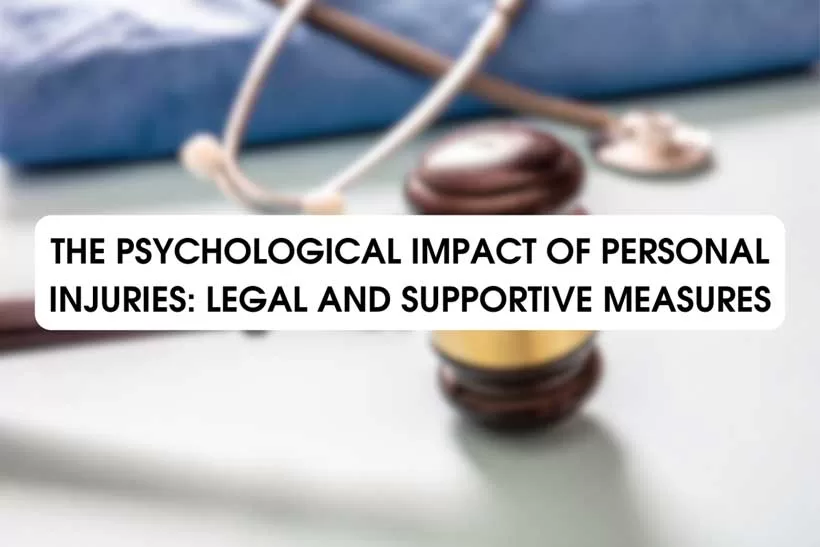This article explores the psychological effects of personal injuries and outlines the legal measures available. We will also discuss how a personal injury law firm can help in securing just compensation for their clients’ mental suffering.
Psychological Effects of Personal Injuries
When people think of personal injuries, they often focus on physical harm—broken bones, cuts, bruises, or more severe conditions. However, the psychological ramifications can be just as debilitating. These impacts can include:
| Psychological Consequences | Symptoms |
| Post-Traumatic Stress Disorder (PTSD) | Flashbacks, severe anxiety, and uncontrollable thoughts about the injury |
| Depression | A persistent feeling of sadness, loss of interest in activities, and changes in sleep and appetite |
| Anxiety | Constant worry and fear about their health, financial stability, or ability to return to normal life |
| Chronic Stress | Persistent stress, irritability, difficulty concentrating |
The mental suffering can bring serious complications to the life of a personal injury accident victim. The possible disorders may require specialized medical care and continuous support. Not to mention, injured people typically have to deal with physical health issues at the same time. So, seeking legal measures is important to compensate for the health consequences and discomfort caused by such situations.
Legal Measures for Psychological Injuries
Recognizing the psychological impacts of personal injuries is crucial in the legal realm. Personal injury law has provisions to address these non-physical damages, often referred to as “pain and suffering” or “emotional distress.” Legal measures to consider include:
- Compensation for Pain and Suffering: Victims can seek compensation not only for their physical injuries but also for the emotional and psychological pain endured. This compensation aims to acknowledge the full extent of the victim’s suffering.
- Medical Expenses: Beyond physical treatments, victims can claim costs related to psychological therapy, medication, and other mental health treatments necessary for recovery.
- Loss of Enjoyment: If the injury results in a significant change in the victim’s quality of life, they can claim damages for loss of enjoyment. This can include the inability to participate in hobbies or activities they once enjoyed.
- Punitive Damages: Punitive damages may be granted in situations involving severe injuries, extreme negligence, or intentional harm. These are meant to penalize the offender and discourage future instances of the same action.
The Role of a Personal Injury Lawyer
Personal injury lawyers play a vital role in ensuring that victims receive fair compensation for both physical and psychological injuries. Here’s how they can assist:
- Case Evaluation: A personal injury lawyer will thoroughly evaluate the case, considering all aspects of the injury, including psychological impacts. They gather evidence, medical records, and expert testimonies to build a strong case.
- Negotiation with Insurance Companies: Insurance firms want to keep payouts as low as possible. A skilled lawyer will negotiate assertively on the victim’s behalf to ensure fair compensation is obtained.
- Legal Representation: Should the case go to court, a personal injury lawyer will provide robust legal representation, presenting evidence and arguments effectively to achieve the best possible outcome.
- Support and Guidance: Navigating the legal system can be daunting, especially when dealing with psychological distress. Lawyers offer much-needed support and guidance, helping victims understand their rights and the legal processes involved.
Supportive Measures for Psychological Recovery
Legal measures alone are not sufficient for recovery from psychological injuries. Comprehensive support is essential to help victims regain their mental health and well-being. Key supportive measures include:
- Counseling and Therapy: Professional mental health services such as counseling and therapy are crucial. These services help individuals process their trauma, develop coping strategies, and work towards recovery.
- Support Groups: Connecting with others who have experienced similar injuries can provide emotional support and understanding. In support groups, people get a safe space to share experiences and advice.
- Medication: For some, medication may be necessary to manage symptoms of depression, anxiety, or PTSD. A psychiatrist can provide appropriate prescriptions and monitor progress.
- Mindfulness and Stress-Reduction Techniques: Practices like mindfulness, meditation, and yoga can help reduce stress and improve overall mental well-being.
- Healthy Lifestyle: Maintaining a healthy lifestyle, including regular exercise, a balanced diet, and adequate sleep, supports mental health. Physical activity, in particular, can have a positive impact on mood and stress levels.
To Sum Up
The psychological impact of personal injuries is profound and far-reaching, affecting victims’ quality of life and overall well-being. Understanding these impacts and the legal and supportive measures available is essential for providing comprehensive care and ensuring justice.
Personal injury lawyers are crucial in navigating the legal system and securing fair compensation, while supportive measures such as therapy, support groups, and healthy lifestyle choices are vital for psychological recovery. If you need help from a legal representative to get fair compensation for your pain and suffering, reach out to Michael Kelly Injury Lawyers by calling 617-444-4444. This experienced law firm will fight to achieve justice in your personal injury case.
